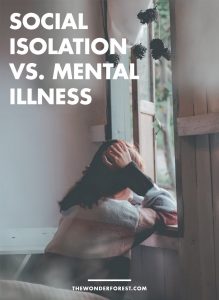Social isolation. Self isolation. These terms have a huge meaning right now with all that’s going on in the world. We are trying to do what’s best for the state of health for all people and currently this is the one major thing that we can all do to protect those around us.
The idea of staying at home and trying to isolate yourself from the world might seem like a frustrating task for many people. How will you adapt and change your schedule? What if you need some supplies? What will you do with your kids? What on earth are you supposed to do with yourself!?
What if I told you that for a percentage of the population, isolation is everyday life — regardless of a pandemic.
About 1.5% of adults struggle with agoraphobia, a mental illness that creates a fear of leaving their homes or being in situations that they cannot escape from.
I was one of them.
I suffered with this mental illness for many years and there didn’t seem to be anything I could to do stop it. Going to get groceries, to get the mail, to get into a car, and to have basic everyday social interactions caused uncontrollable panic attacks and feelings of terror. My life happened within the comfort of my home — from working to buying most items online. Every day was a struggle to complete “normal” tasks and it seemed like it would never end.
The worst part — friends and family didn’t understand. They thought I was making excuses for missing out on get-togethers and events which caused me to lose a lot of people in my life. The truth was that I wanted to be there and felt incredible guilt when my own mind and body wouldn’t allow me the freedom to do so. It was awful and I wouldn’t wish this mental disorder on anybody.
For a former agoraphobe, to see the world in the state that it’s in right now has been extremely odd. People are panic-buying and creating stockpiles of goods in their homes. (Goods that should be reserved for those who actually need and rely on them). The recommendation of “staying home” has created a situation in which a lot of people can’t possibly understand how they’re supposed to go on about their lives. Memes about self quarantining and social media posts from friends sharing what they’re doing while stuck at home are being posted every second. It’s a definite change from the average person’s daily routine, that’s undeniable. I can’t help but wonder if others realize that for a lot of people, this is normal life.
Not many people understand what somebody with agoraphobia goes through, so I want to use this rare opportunity to try to put it into perspective. Maybe then more people will be understanding and helpful to those who suffer.

As a whole, we have come to a place right now where we don’t have the freedom to do everything we would like to do, and for good reason. We are being told by governments and health officials to stay away from gatherings and to be inside as much as possible for fear of something bad happening (the spreading of this virus). Now imagine that instead of health and government agencies telling us what to do, your very own brain is doing the same thing and instilling fear and panic inside of you. Only this time, there is no virus. There is absolutely nothing to be afraid of and no reason to isolate yourself. Still, you can’t help but think “if I venture out of my home, something bad will happen…”
In both cases, you isolate yourself from the world.
The situations are different but the end result is the same: isolation. However, in the first instance you can go back to your normal life after a couple of weeks. Maybe you’ll go back to work and share stories with your friends and co-workers about how your quarantine experience was. Maybe it was a wonderful time that allowed you to focus on yourself or your family, or maybe it was awful because you couldn’t do the things you wanted to do.
For those with agoraphobia, it’s unfortunately not as easy as just returning to normal life. It can take years and a lot of self work to overcome this mental illness and to be comfortable exiting self isolation. You can’t share stories because talking about it with others might confuse them or cause them to think you’re crazy… which is why a lot of mental illnesses go untreated.
For many, this is not just a limited time inconvenience. It is an unwanted, tragic lifestyle that affects them daily. It’s not funny and is not something that we all get to experience together. I hope the more that people become aware of this issue, the more we can erase stigmas and be understanding and helpful to those who just want their lives back. Until then, enjoy your time at home the best you can and stay safe.
Pin This:
Last Updated on


